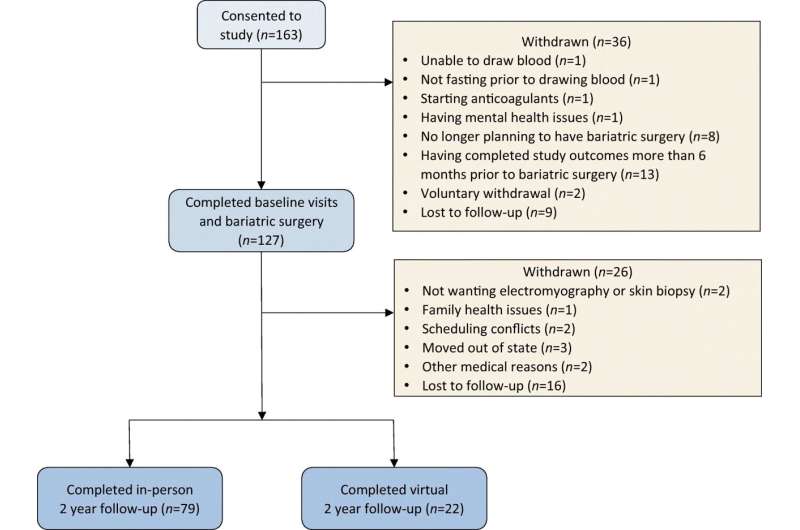This article has been reviewed according to Science X's editorial process and policies. Editors have highlighted the following attributes while ensuring the content's credibility:
fact-checked
peer-reviewed publication
trusted source
proofread
Bariatric surgery may reverse diabetes complications for people with obesity

For more than 100 million Americans who are obese, bariatric surgery may reverse complications related to diabetes, including regenerating damaged nerves, a Michigan Medicine study shows.
A research team led by the University of Michigan Health Department of Neurology followed more than 120 patients who underwent bariatric surgery for obesity over two years after the procedure. They found that all metabolic risk factors for developing diabetes, such as high glucose and lipid levels, improved outside of blood pressure and total cholesterol, according to results published in Diabetologia.
Investigators also found that patients two years removed from bariatric surgery showed improvements in peripheral neuropathy, a condition marked by damage to the nerves that go from the spinal cord all the way to the hands and feet.
"Our findings suggest that bariatric surgery likely enables the regeneration of the peripheral nerves and, therefore, may be an effective treatment for millions of individuals with obesity who are at risk of developing diabetes and peripheral neuropathy," said senior author Brian C. Callaghan, M.D., M.S., a neurologist at University of Michigan Health and the Eva L. Feldman, M.D., Ph.D., Professor of Neurology at U-M Medical School.
Obesity is the second leading risk factor for peripheral neuropathy after diabetes, which affects more than 30 million Americans.
Researchers assessed two primary measures for peripheral neuropathy in patients with obesity by taking skin biopsies that show the nerve fiber density in the thigh and the leg. Two years after bariatric surgery, nerve fiber density improved in the thigh and remained stable in the leg.
Compared to previous studies of medical weight loss, when providers guide a patient's weight loss goals, bariatric surgery led to better metabolic improvements and even greater improvements in peripheral neuropathy.
"Given the natural history of peripheral neuropathy decline in patients with obesity, even stability in nerve fiber density may be considered a successful result," said first author Evan Reynolds, Ph.D., lead statistician for the NeuroNetwork for Emerging Therapies at Michigan Medicine. "Therefore, our findings of stability of nerve fiber density in the leg and improvement in nerve fiber density at the thigh indicate that bariatric surgery may be a successful therapy to improve or reverse peripheral neuropathy for patients with long-term metabolic impairment."
Treatment for peripheral neuropathy currently focuses on pain, including oral medications such gabapentin and sodium channel blockers, topical analgesics and non-medical treatments, like exercise and cognitive behavioral therapy.
More information: Evan L. Reynolds et al, The effect of surgical weight loss on diabetes complications in individuals with class II/III obesity, Diabetologia (2023). DOI: 10.1007/s00125-023-05899-3




















